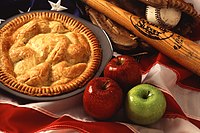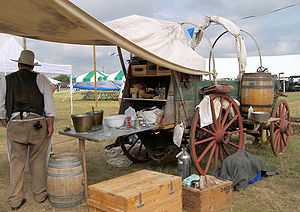Chuckwagon
| Part of a series on |
| American cuisine |
|---|
 |
|

A chuckwagon is a type of field kitchen covered wagon historically used for the storage and transportation of food and cooking equipment on the prairies of the United States and Canada.[1] Such wagons formed part of a wagon train of settlers or fed traveling workers such as cowboys or loggers.
In modern times, chuckwagons feature in certain cooking competitions and events. Chuckwagons are also used in a type of horse racing known as chuckwagon racing.
History[]
While some form of mobile kitchens had existed for generations, the invention of the chuckwagon is attributed to Charles Goodnight, a Texas rancher known as the "father of the Texas Panhandle,"[2] who introduced the concept in 1866.[3][4] (The term "chuck wagon" comes from "chuck", a slang term for food, and not from the nickname for "Charles".[5]) After the American Civil War, the beef market in Texas expanded. Some cattlemen herded cattle in parts of the country that did not have railroads, requiring them to be fed on the road for months at a time.[6] Goodnight modified a Studebaker-manufactured covered wagon, a durable Civil War army-surplus wagon, to suit the needs of cowboys driving cattle from Texas to sell in New Mexico. He added a "chuck box" to the back of the wagon, with drawers and shelves for storage space and a hinged lid to provide a flat working surface. A water barrel was also attached to the wagon and canvas was hung underneath to carry firewood. A wagon box was used to store cooking supplies and cowboys' personal items.[4]
Chuckwagon food typically included easy-to-preserve items such as beans, salted meats, coffee, and sourdough biscuits. Food would also be gathered en route. There was no fresh fruit, vegetables, or eggs available, and meat was not fresh unless an animal was injured during the run and therefore had to be killed. The meat they ate was greasy cloth-wrapped bacon, salt pork, and beef, usually dried, salted or smoked.[7][8] On cattle drives, it was common for the "cookie" who ran the wagon to be second in authority only to the "trailboss." The cookie would often act as cook, barber, dentist, and banker.[9]
Cook-offs[]

The American Chuckwagon Association is an organization dedicated to the preservation of the heritage of the chuckwagon. Its members participate in chuckwagon cook-offs throughout the U.S.[10]
The Academy of Western Artists presents an annual award for outstanding chuckwagon cooking, as well as honors in other fields relating to the culture of the American cowboy.[11]
Racing[]

Chuckwagon racing is an event at some rodeos, mainly in Western Canada, such as the Calgary Stampede,[12] which Kelly Sutherland won 12 times.[13] Chuckwagon races were held from 1952 until 1998 at Cheyenne Frontier Days,[14] one of America's biggest rodeos. There are a few professional chuckwagon racing circuits that operate in North America, with the premiere circuit being run by the World Professional Chuckwagon Association (WPCA) based in Calgary, Alberta, the Western Chuckwagon Association out of Grande Prairie, Alberta, and Canadian Professional Chuckwagon Association in Saskatchewan. A yearly chuckwagon race event is still held in Clinton, Arkansas.[15]
Chuckwagons are raced around a figure eight barrel obstacle, and the stove and tent poles within the wagon must not be lost. The racing team also has two to four "outriders" who load the stove and tent poles at the start and must finish the race with the chuckwagon. Many such races are held each year in Western Canadian cities and towns.
Animal welfare[]
In 2019 alone, six horses were killed in Alberta's Chuckwagon races at the Calgary Stampede. Animal welfare and animal rights groups have called for an end to such events.[16]
Chuckwagon suppers[]


During the summer, tourists can experience chuckwagon suppers across the traditional cattle ranges of the Western United States and Western Canada, either on their own or as part of a trail ride or stay at a dude ranch. These are sometimes followed by live entertainment.[17][18][19]
See also[]
Notes[]
- ^ Smith, Sheryl. "Cowboy Cooking". American Profile. Archived from the original on 2009-07-08. Retrieved 2010-01-25.
- ^ In the Driftway. (1928). [Article]. Nation, 126(3281), 589-590.
- ^ "American Chuck Wagon Association: The Invention of the Chuck Wagon". americanchuckwagon.org. Archived from the original on 2021-09-04. Retrieved 2021-11-05.
- ^ a b Garrison, Mary Helen. "Charles Goodnight". Harding County, NM. Archived from the original on 2011-10-02.
- ^ Harper, Douglas (2010). "chuck (n.)". Online Etymology Dictionary. Archived from the original on 2012-10-20. Retrieved 2011-08-02.
- ^ Thompson, Bill. "American Chuck Wagon Association". Archived from the original on 2011-09-02. Retrieved 2014-10-30.
- ^ Sharpe, P. (1996). Camping it up. [Article]. Texas Monthly, 24(9), 92.
- ^ Butler, Stephanie (August 8, 2014). "From Chuck Wagons to Pushcarts: The History of the Food Truck". HISTORY.com (A&E Television Networks). Archived from the original on 14 December 2014. Retrieved 13 December 2014.
- ^ "Chuck Wagon". Phudpucker.com. Archived from the original on 2008-05-09. Retrieved 2010-01-25.
- ^ "American Chuck Wagon Association: Competitve Events". Americanchuckwagon.org. Archived from the original on 2019-12-25. Retrieved 2020-01-04.
- ^ "AWAAwards.org". The Academy Of Western Artists. www.awaawards.org. Archived from the original on January 31, 2012. Retrieved December 24, 2017.
- ^ "Calgary Stampede Chuckwagon Races". Roadtripamerica.com. Archived from the original on 2010-02-06. Retrieved 2010-01-25.
- ^ "Profile - Kelly Sutherland". Official website of the World Professional Chuckwagon Association. www.wpca.com. Archived from the original on 2019-03-30. Retrieved December 7, 2017.
- ^ "Wagon races may return". Sharkonline.org. 2006-10-19. Archived from the original on 2010-07-14. Retrieved 2010-01-25.
- ^ "Chuckwagon Race". Chuckwagonraces.com. Archived from the original on 2010-01-11. Retrieved 2010-01-25.
- ^ "Total of 6 Calgary Stampede chuckwagon horses dead after 3 more put down Sunday". CBC. 15 July 2019. Archived from the original on 15 July 2019. Retrieved 16 July 2019.
- ^ "Pioneer Fare: The Chuck Wagon Dinner". Visit The USA. Archived from the original on 2017-03-23. Retrieved 2021-11-05.
- ^ "Ranches Offer 'Old West' Adventure". 30 June 1991. Archived from the original on 5 November 2021. Retrieved 6 April 2021.
- ^ "Horseback Riding | Alberta Canada". Archived from the original on 2021-04-15. Retrieved 2021-04-06.
External links[]
| Wikimedia Commons has media related to Chuckwagons. |
- American cattlemen
- American frontier
- Cuisine of the Western United States
- Restaurants by type
- Wagons
- Rodeo-affiliated events